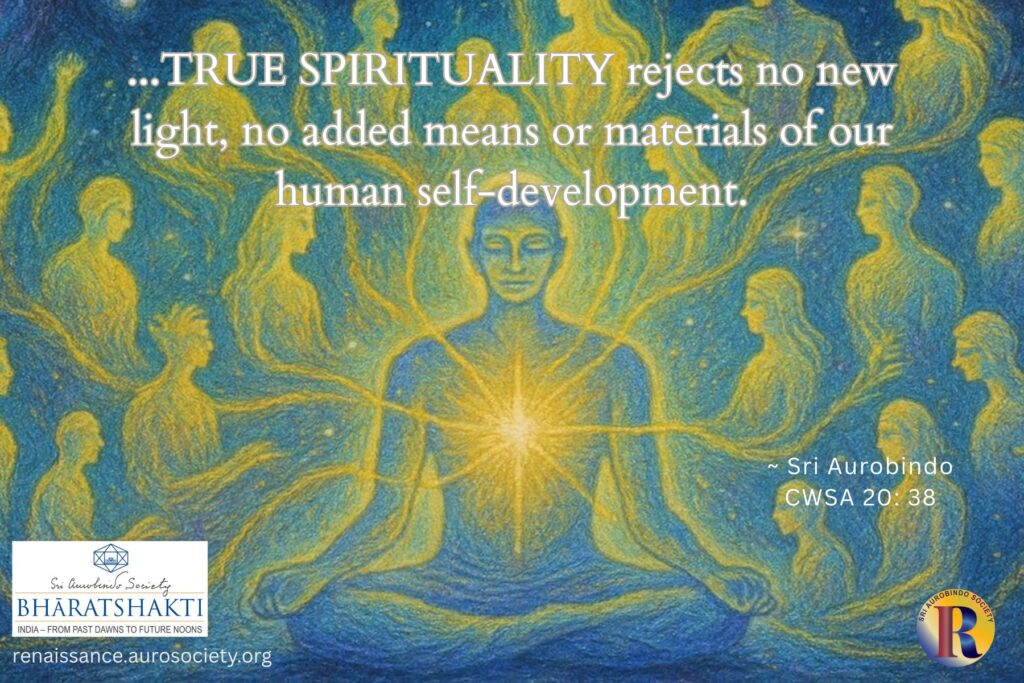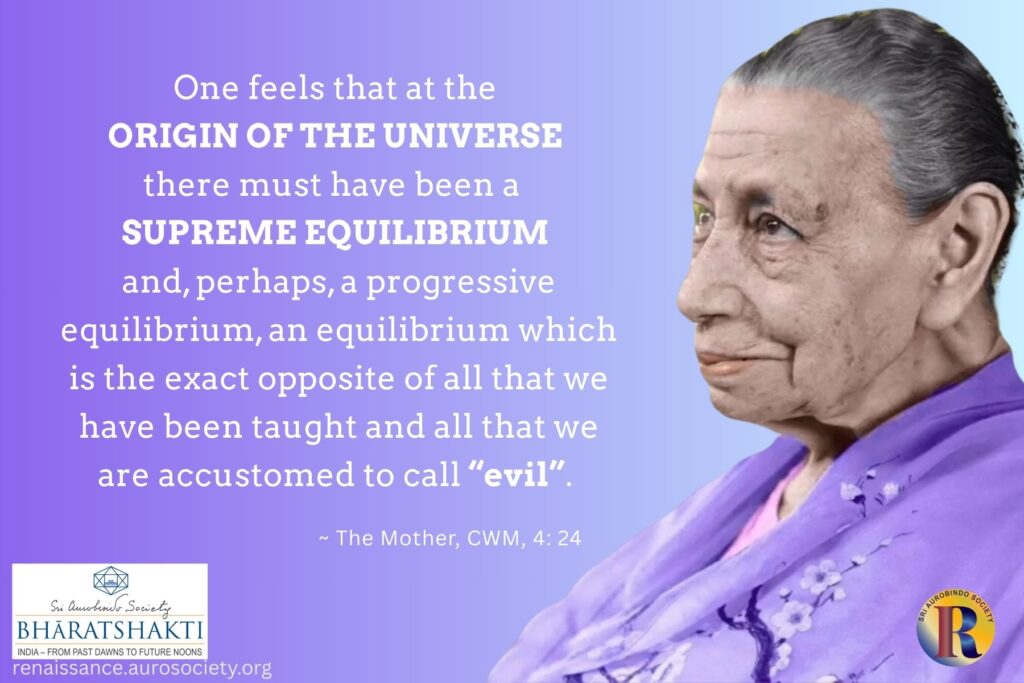Volume V, Issue 6-7
Author: The Mother
Editor’s Note: We have collated a few passages from the Mother’s writings and conversations related to Education. She highlights the significance of silence for learning, and also gives teachers and students great practical guidance in this regard.

Five principal phases of Mental Education
A true mental education, which will prepare man for a higher life, has five principal phases. Normally these phases follow one after another, but in exceptional individuals they may alternate or even proceed simultaneously. These five phases, in brief, are:
(1) Development of the power of concentration, the capacity of attention.
(2) Development of the capacities of expansion, widening, complexity and richness.
(3) Organisation of one’s ideas around a central idea, a higher ideal or a supremely luminous idea that will serve as a guide in life.
(4) Thought-control, rejection of undesirable thoughts, to become able to think only what one wants and when one wants.
(5) Development of mental silence, perfect calm and a more and more total receptivity to inspirations coming from the higher regions of the being.
[…]
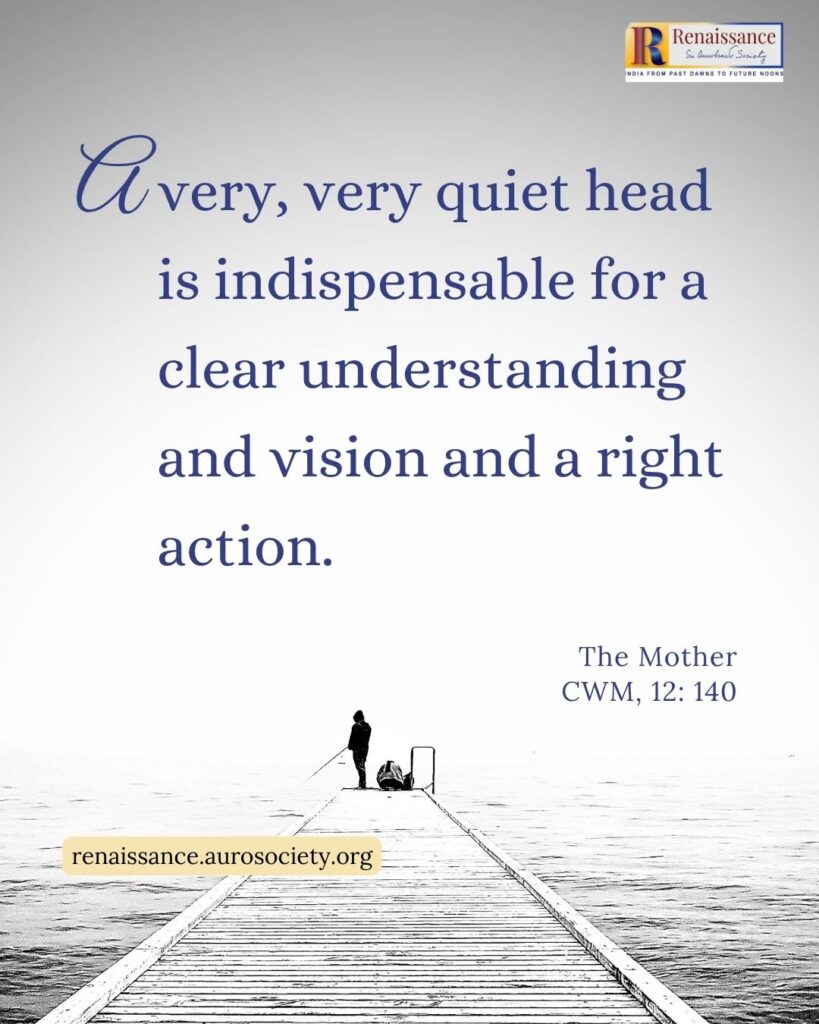
Why mental silence is useful
In… silence one can gradually open to the higher regions of the mind and learn to record the inspirations that come from there.
But even before reaching this point, silence in itself is supremely useful, because in most people who have a somewhat developed and active mind, the mind is never at rest.
During the day, its activity is kept under a certain control, but at night, during the sleep of the body, the control of the waking state is almost completely removed and the mind indulges in activities which are sometimes excessive and often incoherent. This creates a great stress which leads to fatigue and the diminution of the intellectual faculties.
The fact is that like all the other parts of the human being, the mind too needs rest and it will not have this rest unless we know how to provide it. The art of resting one’s mind is something to be acquired. Changing one’s mental activity is certainly one way of resting; but the greatest possible rest is silence. And as far as the mental faculties are concerned a few minutes passed in the calm of silence are a more effective rest than hours of sleep.
When one has learned to silence the mind at will and to concentrate it in receptive silence, then there will be no problem that cannot be solved, no mental difficulty whose solution cannot be found. When it is agitated, thought becomes confused and impotent; in an attentive tranquility, the light can manifest itself and open up new horizons to man’s capacity.
~ The Mother, CWM, Vol. 12, pp. 24-29

Best way to make the children discover how to establish silence
A: Mother, now there is one question, another important question. You have often told us that it is only in the inner silence that we can find the true answer to a question. What is the best way to make the children discover how this silence is established? Is this how consciousness is substituted for knowledge?
(Long silence)
You see, in this system of classes where everyone is sitting down, the teacher is there and they have a limited time in which to do the work, it is not possible. It is only if you have absolute freedom that you can establish the silence when you need to be silent. But when all the students are in class and the teacher is in class… when the teacher is establishing the silence in himself, all the students… then it is not possible.
He can establish the silence at home, at night, the day before, to prepare himself for the next day, but you cannot… It cannot be an immediate rule. Naturally, when you are at the very top of the scale and you are used to keeping your mind absolutely silent, you cannot help it; but you have not reached that point, none of you. So it is better not to speak about it.
So I think that during the… Especially with this system, classes with a fixed time, with a fixed number of students, with a fixed teacher, and a fixed subject… you must be active while you are there. . . .
If the students want to practise meditation, concentration, to try to come into… it is to come into contact with the intuitive plane, it is—instead of receiving a purely mental reply which is like that—to receive a reply from above which is a little luminous and living.
But that habit should be acquired at home.
Naturally, someone who has this habit, in the class —when the teacher asks the question, writes this question on the blackboard, “Who can answer?”—he can do this (Mother puts both hands to her forehead), receive, oh! and then say… But when we reach that point, it will be a great progress.
Otherwise, they bring out of the storeroom everything they have learnt. It is not very interesting, but at least it gives them some mental gymnastics.
And the class system is a democratic system, eh?
This is because… you must be able in a limited time, in a limited space… you have to teach the greatest possible number of people, so that everyone can benefit. This is the democratic spirit, absolutely. So this requires, this requires a kind of… equalisation. Well… you put them all on the same level and that is deplorable.
But in the present state of the world, we can say, “This is still something necessary.” Only the children of the rich would be able to afford… obviously, it is not pleasant to think of. . . how can we prepare the children, children taken from anywhere, who have no way of learning at home, whose parents are ignorant, who have no possibility of having any means to learn, nothing, nothing, nothing but the raw material, like that—how can we teach them to live?
[…]
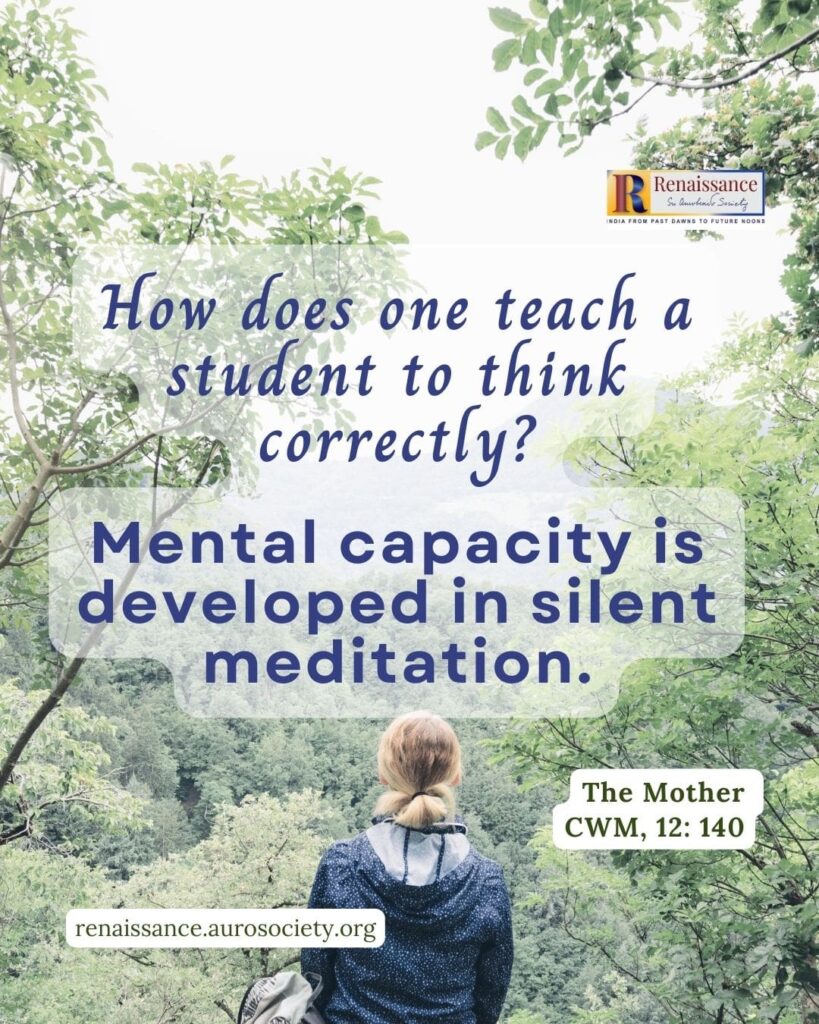
Silence Exercise in Classroom
One thing could be done once, at least once: you set a subject, like that, from the course of subjects, you set it and tell them, “For a quarter of an hour we shall remain silent, silent; no noise, no one should make any noise. We shall remain silent for a quarter of an hour. For a quarter of an hour try to remain completely silent, still and attentive, and then we shall see in a quarter of an hour what comes out of it.”
You can reduce it to five minutes to begin with, three minutes, two minutes, it doesn’t matter. A quarter of an hour is a lot, but you should do… try that… see. Some of them will start to fidget. Very few children, perhaps, know how to keep still; or else they fall asleep—but it doesn’t matter if they fall asleep.
You could try that at least once, see what happens: “Let’s see! Who will answer my question after ten minutes’ silence? And not ten minutes which you will spend trying to get hold of everything you may know mentally about the subject, no, no—ten minutes during which you will be just like this, blank, still, silent, attentive… attentive and silent.”
Now, if the teacher is a true teacher, during these ten minutes, he brings down from the domain of intuition the knowledge which he spreads over his class. And so you do some interesting work, and you will see the results. Then the teacher himself will begin to progress a little. You can try. Try, you will see!
A: We have tried that, Mother.
You see, for those who are sincere, sincere and very—how to put it?—very straight in their aspiration, there is a marvellous help, there is an absolutely living, active consciousness which is ready to… to respond to any attentive silence. You could do six years’ work in six months, but there should… there should not be any pretension, there should not be anything which tries to imitate, there should be no wanting to put on airs. There should… you should be truly, absolutely honest, pure, sincere, conscious that… you exist only by what comes from above. Then… then… then you could advance with giant strides.
But don’t do it daily, regularly, at a fixed time, because it becomes a habit and a bore. It should be… unexpected! Suddenly you say, “Ah! Supposing we did this”… when you feel a little like that yourself, a little ready. That would be very interesting.
You ask a question, a question that is as intelligent as you can make it, not a dogmatic question, an academic question, no—a question that has a little life in it. That would be interesting.
(Silence)
You will see, the more you strive to realise, you will discover in the nature—the lower nature, that is, the lower mind, the lower vital, the physical—how much pretension, sham and ambition there is… The desire to put on airs: all that must be eliminated, absolutely, radically, and replaced by a sincere flame of aspiration, of aspiration for the purity which makes us live only for what the Supreme Consciousness demands of us, which makes us able to do only what it wants, which makes us do only what it wants, when it wants.
Then we can be entirely different…. It is a little far along the path, but we try to do that, always, this purification of the whole being which…
Then there is no more school, teachers, students, boredom; there is… life trying to transform itself. There: that is the ideal, this is where we have to go.

How to get rid of mental inertia?
The cure is not in trying to wake up the mind but in turning it, immobile and silent, upward towards the region of intuitive light, in a steady and quiet aspiration, and to wait in silence, for the light to come down and flood your brain which will, little by little, wake up to this influence and become capable of receiving and expressing the intuition.
Intellectual culture is indispensable for preparing a good mental instrument, large, supple and rich, but its action stops there.
In rising above the mind, it is more often a hindrance than a help, for, in general, a refined and educated mind finds its satisfaction in itself and rarely seeks to silence itself so as to be surpassed.
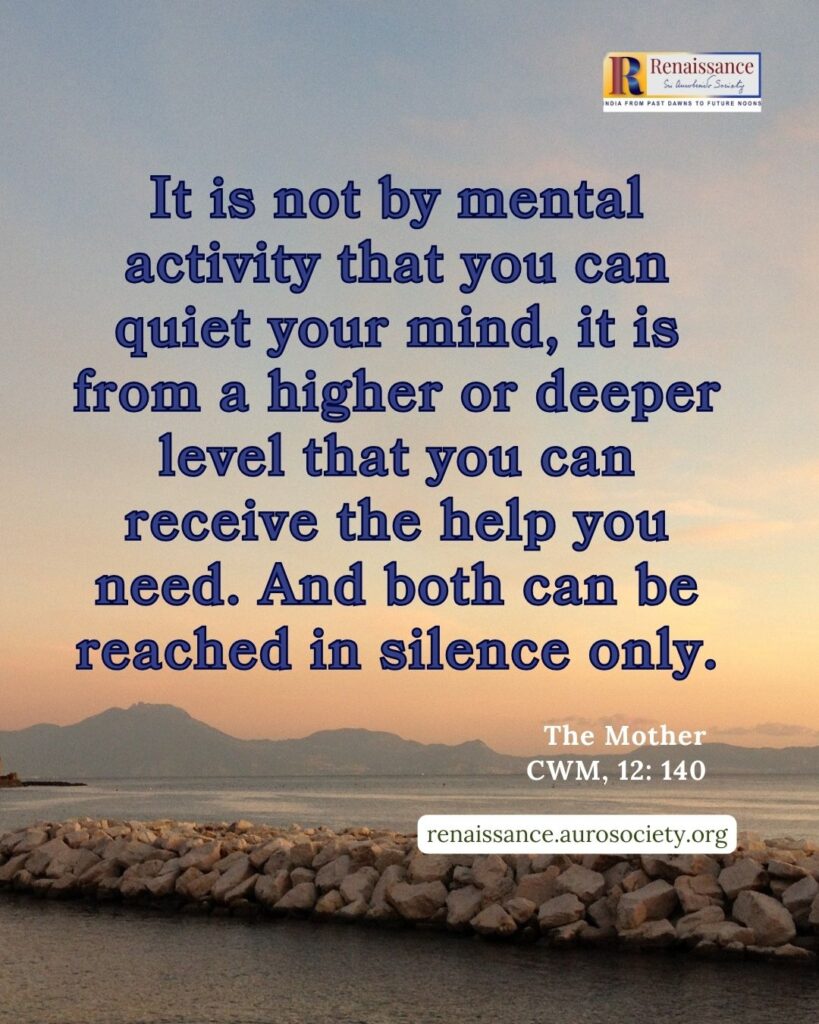
How to stop discussions in the mind?
The first condition is to talk as little as possible.
The second is to think just of what you are doing at the moment and not of what you have to do or of what you have done before.
Never regret what is past or imagine what will be.
Check pessimism in your thoughts as much as you can and become a voluntary optimist.
From the archives:
Developing the Ability to Concentrate: An Educator’s Reflection
~ Design: Beloo Mehra


